We ate a glorious dinner at a long table on the deck of the Al Makhrour Restaurant, laughing and soaking up our hosts’ stories of life in Beit Jala, near Bethlehem. The food was a savoury spread of olives, salads, hummus, pita and grilled meat. A family at a nearby table with pink and white balloons celebrated a baptism. A brown-eyed toddler waved and blew kisses to us from the play area.
A few days later, a bulldozer and wrecking crane levelled the restaurant and the home of the family who owned it. They hold the deed to the land, but like most Palestinians hadn’t been able to secure building permits. The Israeli Supreme Court ordered the buildings demolished as security threats to a nearby illegal Israeli settlement. For us, this was a sad example of daily reality for Palestinians.
You may unsubscribe from any of our newsletters at any time.
Our group of pilgrims counted 11 young adults and two leaders — including me — selected from across the country. The United Church of Canada supports short-term trips to Africa, the Middle East, Asia, Latin America and the Caribbean to deepen understanding and relationships with people there. Rather than planting churches in other countries, the United Church works with more than 100 local groups, or “mission partners,” exchanging resources, ideas and people. When they return, pilgrims carry the stories of those they have met back to Canada.
Our 10-day visit in August was hosted by Wi’am: The Palestinian Conflict Transformation Center, a grassroots, civil society organization and mission partner of the United Church. In Arabic, wi’am means cordial relationships. The centre offers creative conflict mediation programs for all ages and supports those suffering from mental and physical distress caused by the long-term occupation. Located in Bethlehem, Wi’am’s humble building stands in the shadow of the Israeli security wall, a gun tower and Checkpoint 300, where Palestinians line up for hours every morning in the dark to cross into Israel for work. “Most tourists visiting the Church of the Nativity in Bethlehem don’t realize this birthplace of Jesus is a walled prison,” says Zoughbi Zoughbi, founder of Wi’am.
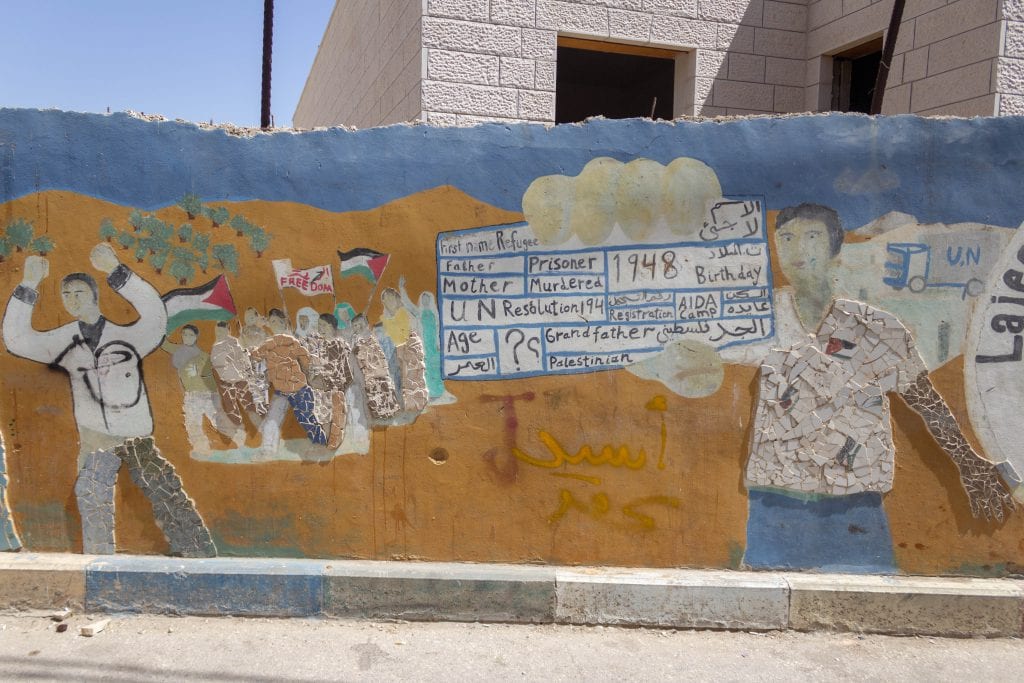
More than four million tourists visit the holy land each year. While we went to the historic religious sites, we also visited places where tensions between Israel and Palestine exist today, including East Jerusalem and the cities of Ramallah and Hebron. We met with activists, organizations and others to learn about their work for justice and to support them with our presence.
One of our first stops was Yad Vashem, the World Holocaust Remembrance Center in Jerusalem. We saw brutal and heart-rending artifacts, scale model death camps, recorded stories of survivors and videos of naked corpses stacked like cordwood, all testifying to the depths of human evil — committed by law-abiding citizens like us: shopkeepers, preachers, civil servants, doctors, lawyers. Six million Jews and others were executed, and millions more were subjected to horrific medical experimentation, displaced, robbed of property, persecuted and denied safe harbour in countries like Canada.
Given the Holocaust and historical and ongoing anti-Semitism, Israel — surrounded by hostile nations — prioritizes security and a land for Jews. That legitimate concern for security is also manifest in crushing injustices against Palestinians who for centuries lived on the land now occupied by Israel.
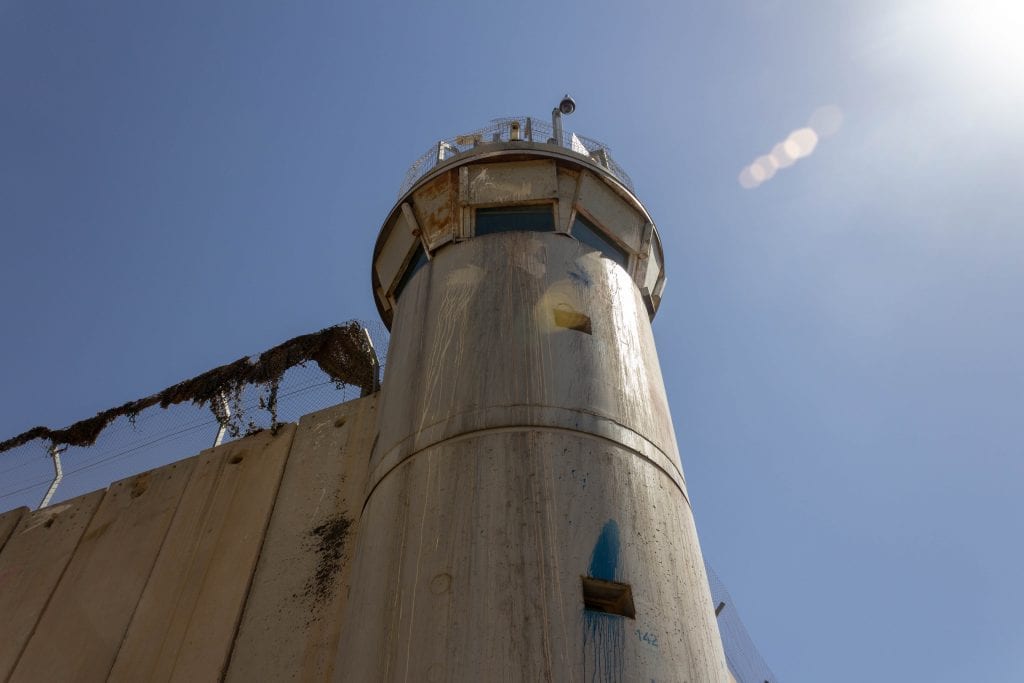
“Israelis grow up surrounded by flak jackets, grenades and tanks, and walls beyond which, they are told, are monsters who want to kill them,” explains a young Jewish woman we met on the trip. She was jailed for rejecting mandatory military service at age 19. “It reinforces the fear of imminent attack and the need for more and more security.” She insists there are alternative ways to increase security — relationship building, equitable access to resources, negotiations, respect for human rights, mediation and shared economies — but the list of injustices is long.
On our bus one day, Usama Nicola told us, “To love your enemy, you have to know them.” But with the wall and intensifying restrictions on Palestinian movement, Israelis and Palestinians rarely meet.
Palestinian territory is occupied by more than 200 illegal settlements and 600,000 Israelis. Homes are arbitrarily demolished; people are collectively punished for individual crimes; access to water is unjust. A 708-kilometre wall and settler-only roads cut off Palestinians’ access to farms, neighbours and markets. Sixty percent of Palestinian territories remain under Israeli military control.
Aida is one of three refugee camps in Bethlehem and was created after the 1948 Nakba (translated as “catastrophe”), when Palestinians were forced to flee their homes during the Arab-Israeli war. Residents of the camp still hold keys to those homes, symbols of their legal right of return. Today there are 5,500 displaced Palestinians in Aida living on less than a square kilometre of land, crammed into stacked concrete dwellings.
As we walked through the camp, we saw marbles in the gutters — children shoot them at soldiers with slingshots. The ground was also littered with exploded tear gas canisters and stun grenades — soldiers shoot them at children shooting marbles. There were Israeli military ration boxes, chip bags and plastic bottles filled with urine, all littered into a Muslim cemetery from a guard post above. We could hear the faint sound of Israeli settler children playing on the other side of the separation wall.
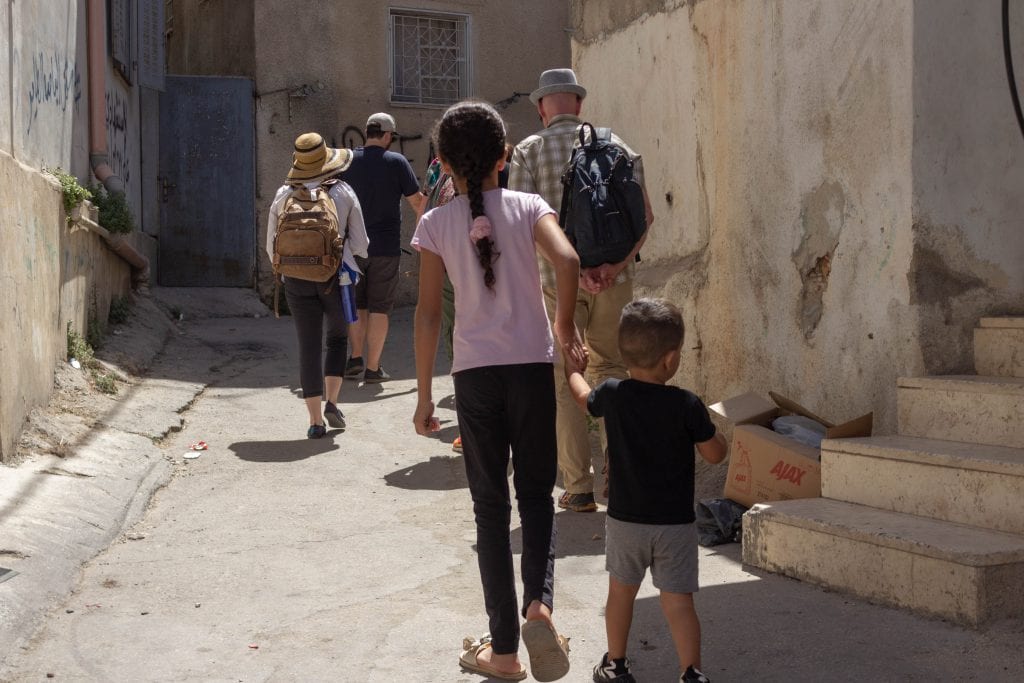
“As we were leaving Aida, someone asked me if I was all right,” says Kendra Helfrich, one of the pilgrims, a young mother and high-school teacher from Saskatchewan. “For the first time in my life, I answered, ‘No. I am not all right.’ I think about those children, the ones with the marbles being tear-gassed, shot with rubber bullets and arrested, and about children the same age playing freely on the other side of the wall, and I am not all right. How could anyone be all right with that?”
In Ramallah, we visited representatives of Defense for Children International Palestine (DCIP), which provides legal aid to children incarcerated in Israeli jails. Each year, the Israeli military arrests and prosecutes around 700 Palestinian children as adults in Israeli military courts unaccountable to civil law. In 2018, 56 Palestinian children died in Israeli military actions.
We visited the Nassar family at their farm outside Bethlehem to learn about their struggle. They have tended vineyards and orchards there for generations and legally own the land, but five expanding settlements surround their farm. They are under constant pressure to relinquish their titles. Israeli courts consistently reject the family’s applications to build, so they make do with caves and temporary shelters, with wind and solar energy and composting toilets. Israeli authorities have blocked the laneway with boulders and bulldozed 1,500 saplings.
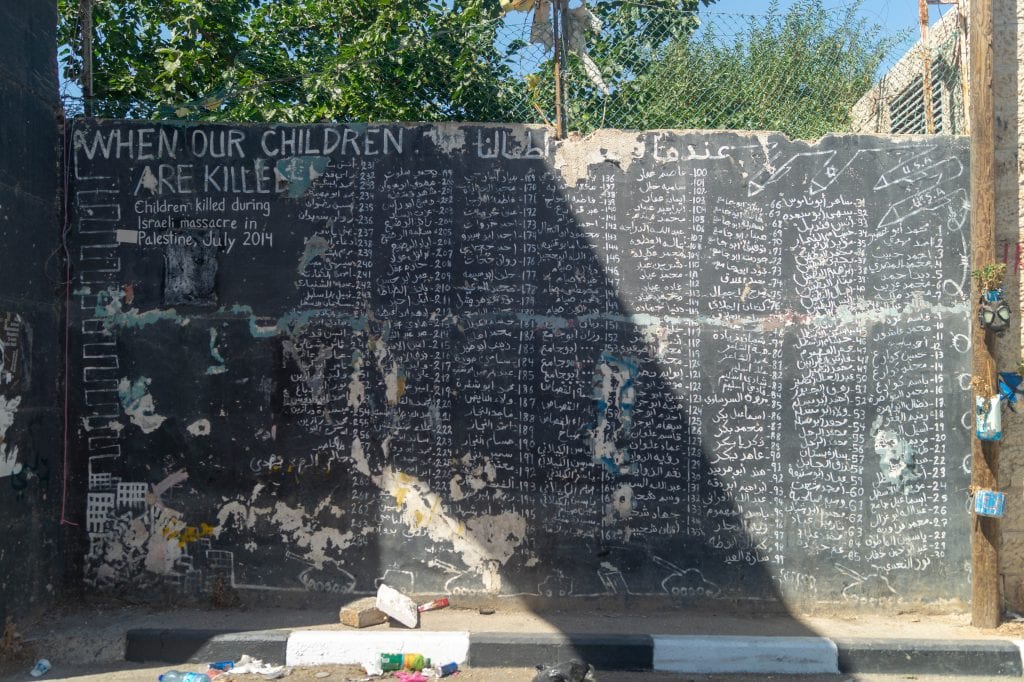
Daoud Nassar described their non-violent strategies for resistance: environmental camps for children; women’s programs; and hosting thousands of international volunteers who work on the farm and whose presence discourages illegal expropriation. A rock near the farm gate is painted with the words: “We refuse to be enemies.”
In Jerusalem, the Sabeel Ecumenical Liberation Theology Center works non-violently for justice, based on Christian faith. The centre endorses a theology of just distribution of land through study, community, worship and street theatre. This focus on land challenged us, as Canadian settlers inhabiting Indigenous land.
On our bus one day, Usama Nicola from Wi’am told us, “To love your enemy, you have to know them.” But with the wall and intensifying restrictions on Palestinian movement, Israelis and Palestinians rarely meet. Our pilgrimage led us to a few exceptions. For example, after Shabbat at a synagogue in Jerusalem, Dr. Maurit Beeri told us about the hospital she directs where Jewish, Muslim and Christian children share rooms. “Some families are very upset, but that’s our policy,” she says. “Everyone is treated the same, together.” Sometimes these families come to know and even love one another.
In a similar way, the Department of Services to Palestinian Refugees, part of the Middle East Council of Churches, brings Israeli and Palestinian organ donor families and recipients together. Their common human frailty, gratitude and interdependence form bridges to relationship.
More on Broadview: How I taught Jewish youth about the Nakba
Throughout the trip, we experienced holiness in unexpected places: sipping lemon-mint slushies in a new, hopeful little café in Aida; seeing the crucifixion represented in the rubble of demolished homes; singing hymns to ease our passage through heavily armed checkpoints; attending a raucous celebration of a hope-filled marriage engagement; and in a young Jewish man sharing his popcorn on our return flight to Canada.
Our pilgrimage began with an interrogation in a back room at Ben Gurion Airport just outside of Tel Aviv. We were separated and asked over and over, “Why are you going to the West Bank?” “Are you going to Ramallah?” “To Hebron?” “Why would you want to go there?”
And over and over, Palestinians reminded us why visiting them matters. “It gives us hope we are not forgotten, that we are not alone.” “It lifts our spirits when you come.” “It gives us hope you that will tell the world what is happening to us.”
This story first appeared in Broadview’s January/February 2020 issue with the title “Bearing witness.”
Broadview is an award-winning progressive Christian magazine, featuring stories about spirituality, justice and ethical living. For more of our content, subscribe to the magazine today.

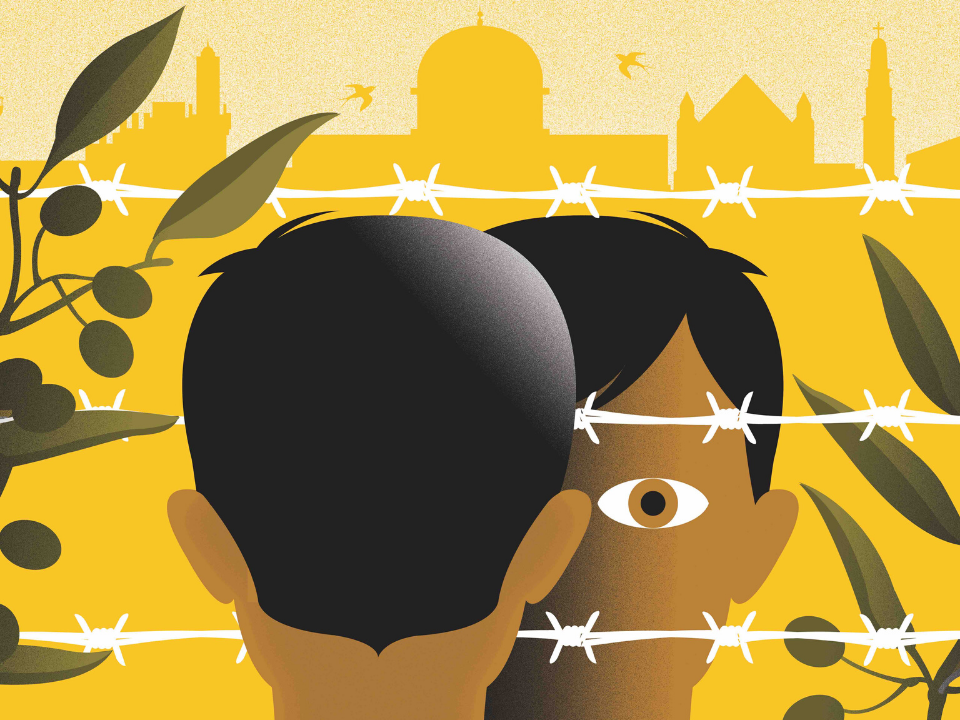


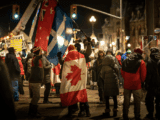
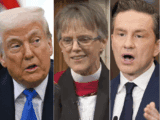



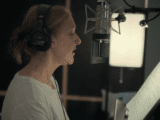

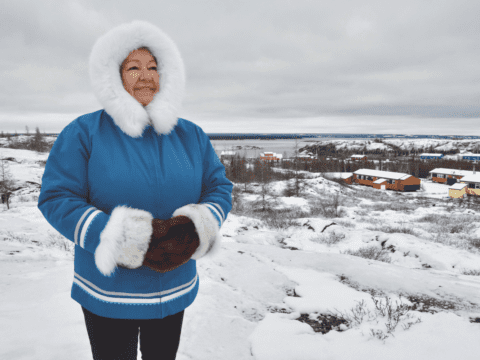

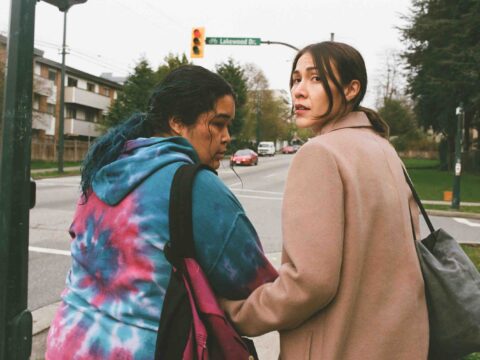

Keep up the good work.
Sling shots are not the only weapon Palestinians use against Israeli soldiers and civilians. I think in the interest of full disclosure the former moderator might have said that the UCC supports BDS against Israel. The UCC also support Sabeel with mission and service dollars. An honest open source study of both Sabeel and BDS movement would leave an objective third party such as a western church more careful about the policies it pursues to support peace in the region. Their is going to be no return unless it is framed within a larger regional peace agreement.
There are about two dozen countries located along an 8000 km stretch from the Atlantic coast of Morocco to the border of India. In terms of political outlook, they range from reasonably pleasant authoritarian monarchies to some of the most brutally repressive dictatorships on earth. Across this vast expanse there’s only one full democracy. One country with a free press. One with independent courts and rule of law. One with expansive LGBTQ rights. This, apparently, is the country that the United Church chooses to spend time vilifying.
In contrast, the two Palestinian regimes routinely given positive press are dictatorships with few civil rights and no press freedom. Both are deeply corrupt. The better of the two pays out bounties to those who murder Jews. The other is a terror organization that seeks to eradicate Israel through violent means – routinely firing barrages of missiles at Israeli farms, towns and cities.
None of this makes Israel blameless, of course. The Netanyahu government has been particularly adept at inflaming tensions for its own short-term ends. There’s no doubt that military options are preferred. Palestinians frequently face deliberate inconvenience and detention at the many road checkpoints. And yes, occasionally land is confiscated under flimsy pretexts.
So, there are many areas where the complicated relationships among all parties could be explored in a balanced way. Unfortunately, by relying primarily on partisan Palestinian ‘humanitarian groups’ as hosts and sources of information the story almost always slants toward caricature: peace loving Palestinians (often children) oppressed by heartless Israelis (usually carrying guns). This presents a simplistic – and thereby false – picture of one of the world’s most complex regions.
For many decades the UCC has taken laudably courageous positions on many socio-political issues. Credit where it’s due. But there’s nothing visionary about the position taken on this issue. It’s overwhelmingly partisan. And morally cheap.
no democracy in Israel. Palestinians were driven from their land at gun point in 1948 and Israel has been encroaching and occupying the West Bank with settlements every day since
Sir. You need to go back and the 1848 history. Had the Arabs agreed to the land deal they were offered in 48, they would have received more territory and concessions than they can ever achieve today. The lack of a regional peace agreement over the last 70 years is the historical failure of Arab leadership. That is changing today in that many of the Arab leaders no longer view the destruction of Israel as their primary foreign policy goal. Except for Iran, of course. There is the main challenge to peace and some form of Palestinian political autonomy. Iran’s political and military influence in Lebanon, the West Bank, Gaza and Syria surrounds Israel. So long as Iran rules in these geographic areas through Hamas or the IRGC or other terrorist and political proxies, there can never be peace. Israel cannot negotiate land that would become forward staging military areas for more attacks on Israel. Palestinian autonomy cannot be solved as a separate issue, apart from a regional security framework. In today’s context, this cannot happen unless Iran renounced state sponsored terrorism and its aim to destroy Israel.
A trip to “the holy land” taught us to bear witness to injustice. This title is very confusing! What “holy land”? The whole created planet earth or the whole creation is holy. “For God so loved the world ( not just one village/town/country!)………..but have eternal life”. One nation on earth can not be holy because the Roman empire occupied it once upon a time. We need to unlearn our Sunday School mindset – sooner the better.
It’s called the Holy Land because this is where three major religions originated. It is also where God was/is most active, and interested in.
Funny, the Jews don’t consider Israel as the Holy Land, it is considered the Promised Land. The Roman Catholic Church penned the name.
The Sabbath is Holy, but it can be defiled, so I think your argument is weak. Eternal life and God’s love comes with a condition. I fear, most people have unlearned their Sunday School mindset.